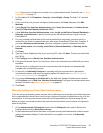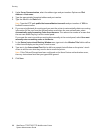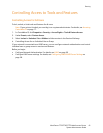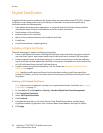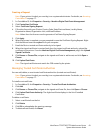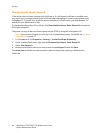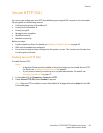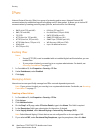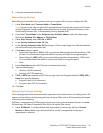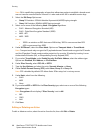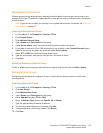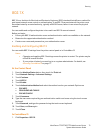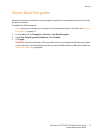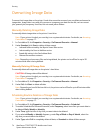Security
WorkCentre 7755/7765/7775 Multifunction Printer
System Administrator Guide
67
8. Configure selected settings below.
Manual Keying Settings
Manual Keying is used when client systems either do not support IKE or are not configured for IKE.
1. Under IPsec Mode, select Transport Mode or Tunnel Mode.
Note: Transport mode only encrypts the IP payload whereas Tunnel mode encrypts the IP header
and the IP payload. Tunnel mode provides protection for an entire IP packet by treating it as an
Authentication Header (AH), or Encapsulating Security Payload (ESP).
2. If you select Tunnel Mode, under Enable Security End Point Address, select the address type.
Options are Disabled, IPv4 Address, or IPv6 Address.
3. Under IPsec Security, select ESP, AH, or BOTH.
4. In the Security Parameter Index: IN field.
5. In the Security Parameter Index: OUT field, type a 32-bit number larger than 256 that identifies
the outbound Security Association (SA).
6. Under Hash, select an option:
• Secure Hash Algorithm 1 (SHA1): SHA1 is a one-way hashing algorithm that produces a 128-
bit hash. It is considered stronger than MD5 for security, but slower for encryption speed.
•Method Digest 5 (MD5): MD5 is a one-way hashing algorithm that produces a 128-bit hash.
It is considered weaker than MD5 for security, but faster for encryption speed.
•None
7. Under Enter Keys as, select ASCII format or Hexadecimal number.
8. Type the following keys:
• Hash Key: IN (20 characters)
• Hash Key: OUT (20 characters)
9. If ESP or BOTH were selected as the IP Security type, select the Encryption Method (3DES, AES, or
None) then type the following:
• Encryption Key: IN (24 characters)
• Encryption Key: OUT (24 characters)
10. Click Save.
Internet Key Exchange Settings
IKE is a keying protocol that allows automatic negotiation and authentication, anti-replay services, CA
support, and the ability to change encryption keys during an IPSec session. IKE is generally used as part
of virtual private networking.
IKE Phase 1 authenticates the IPSec peers and sets up a secure channel between the peers to enable
IKE exchanges. IKE Phase 2 negotiates IPSec SAs to set up the IPSec tunnel.
1. Under IKE Phase 1, in the Key Lifetime field, type length of time this key will live in Seconds,
Minutes, or Hours. When a key reaches its lifetime, the SA is renegotiated and the key is
regenerated or refreshed.



